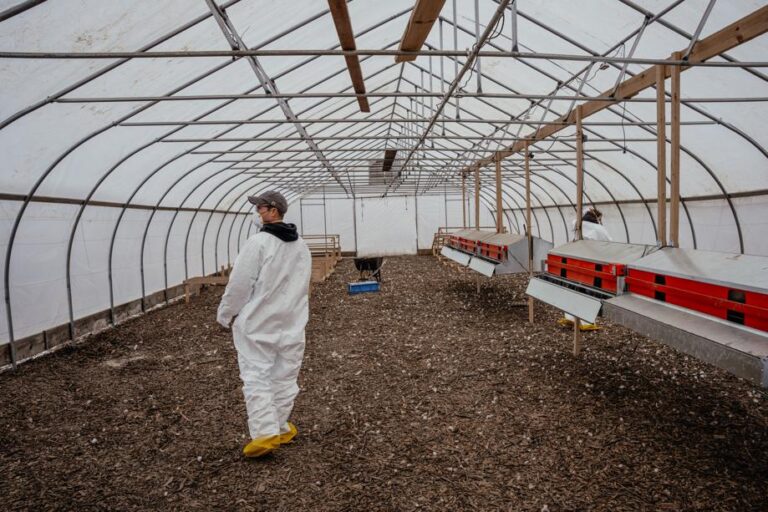Dr. Ashish K. Jha is dean of Brown University School of Public Health and a contributing Globe Opinion writer.
Of all the misguided decisions Robert F. Kennedy Jr. has made as secretary of Health and Human Services, canceling Moderna’s contract to develop a bird flu vaccine may be the most dangerous yet.
Bird flu — specifically the H5N1 strain of avian influenza — is deadly and unpredictable, and it continues to evolve in ways that have raised real concerns among virologists and public health experts. Historically, about half the people infected with the virus have died — and unlike other respiratory viruses, it doesn’t spare the young or healthy. The virus, traditionally confined to birds (thus the name), is now spreading more broadly among mammals. There have been large-scale die-offs of seals. More recently, there have been infections among bears, in more than 1,000 herds of dairy cows, and among the people and animals, like cats, that have come in contact with these cows and their milk.
In the United States, dozens of people have tested positive for H5N1, many of whom are workers on dairy farms. One person — a man over the age of 65 from Louisiana — died earlier this year. Globally, the virus has also caused other tragic outcomes, including the death of a 3-year-old girl in Mexico and an 11-year-old boy in Cambodia after exposure to sick birds.
To date, nearly all known human cases have likely come from direct contact with infected animals or their secretions, such as milk. Many of these kinds of infections — the ones that come from physical contact as opposed to respiratory droplets — can be milder, including pink eye-like symptoms.
The virus has yet to spread easily from person to person. That could change, and H5N1 could spread airborne, similar to COVID-19. And if it does, the world could be staring down a pandemic far worse than COVID-19.
That’s the threat that prompted the Biden administration to invest in next-generation vaccines against H5N1. It awarded a $600 million contract to Moderna — the folks who developed one of the first successful and effective mRNA-based COVID-19 vaccines — to develop an mRNA-based vaccine against H5N1. That’s the contract Kennedy has canceled. It’s a decision that defies logic and appears rooted in both a hatred of vaccines and a fear of the mRNA platform. Most importantly, it puts the lives and health of the American people at risk and undercuts years of scientific progress.
We’ve seen what’s possible when we invest early. The mRNA platform that gave the nation life-saving COVID-19 vaccines was the result of more than a decade of research, much of it funded by the National Institutes of Health. Scientists spent years studying coronaviruses, particularly the original SARS virus, and developed a detailed game plan for a vaccine against that virus. That foundational work gave our nation a head start when SARS-CoV-2 hit, allowing the quick development of vaccines and for Operation Warp Speed, which took place during the first Trump administration, to test those vaccines rapidly. That same foresight was driving the Moderna bird flu contract and research.
Developing and refining an mRNA vaccine demands testing and time. Scientists must design and test the antigen, determine optimal dosing, and assess safety and effectiveness — work that takes months and often years. Waiting to develop a vaccine candidate until the world is actually confronting a bird flu pandemic would leave America dangerously behind. That’s why investing in a human vaccine is one of the top things I said the Trump administration must do to combat bird flu. To be sure, the federal government does have a small stockpile of old H5N1 vaccines — but it’s not clear they would work against emerging strains. What is clear is that the mRNA platform could be used to build targeted vaccines.
This is exactly the kind of public health challenge the government should address. There’s no viable commercial market for an H5N1 vaccine — and if we’re lucky, there never will be. We cannot rely on the private sector to invest in pandemic prevention. And waiting to develop vaccines until a pandemic has started is like telling a fire department to start hiring after a neighborhood has gone up in flames.
The rationale behind the contract’s cancellation doesn’t hold up. HHS cited safety concerns with mRNA vaccines, calling continued investment in Moderna’s vaccine “not scientifically or ethically justifiable.’’ That’s nonsense. mRNA is a naturally occurring molecule found in nearly every human cell. COVID-19 mRNA vaccines underwent some of the most rigorous clinical trials in history, involving more than 70,000 participants. Since then, about 2 billion of these mRNA vaccines have been administered globally. Yes, they have rare side effects — all medicines do — but their safety profile is extraordinarily strong.
This isn’t just about H5N1. The mRNA platform is a breakthrough technology that can be adapted for a wide range of threats, from emerging viruses to cancer. Canceling a project like this is scientific sabotage that undermines years of investment and slows progress across the board.
The federal government should be investing and working to expand the nation’s scientific and public health arsenal, not shrinking it. The systems we build today — the research, the platforms, the partnerships — are what protect us tomorrow. Canceling this contract undermines progress, weakens readiness, and increases the odds that we’ll be caught flat-footed when the next pandemic strikes.
And if that pandemic is driven by a virus as deadly as bird flu, the cost won’t just be measured in dollars — it will be measured in lives.

